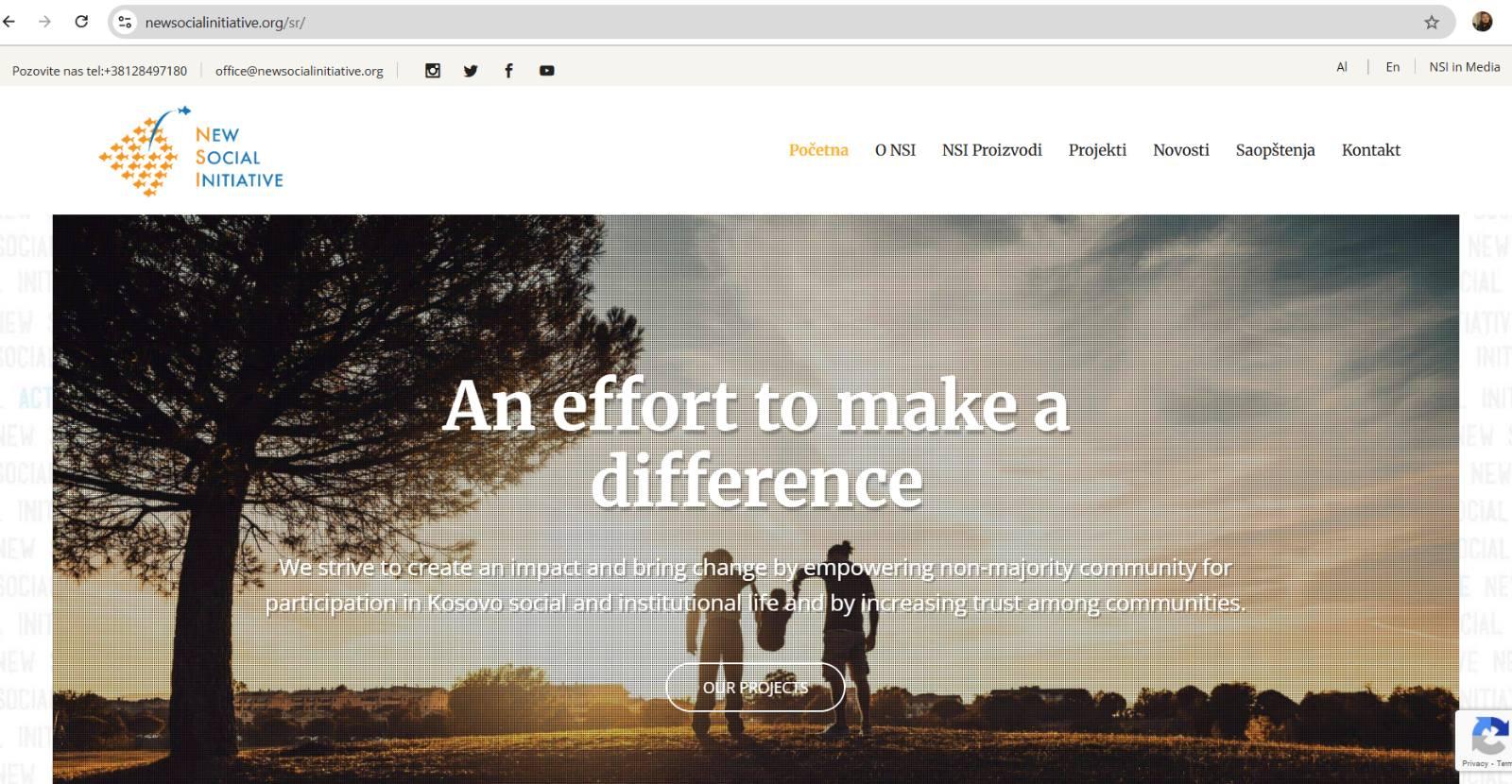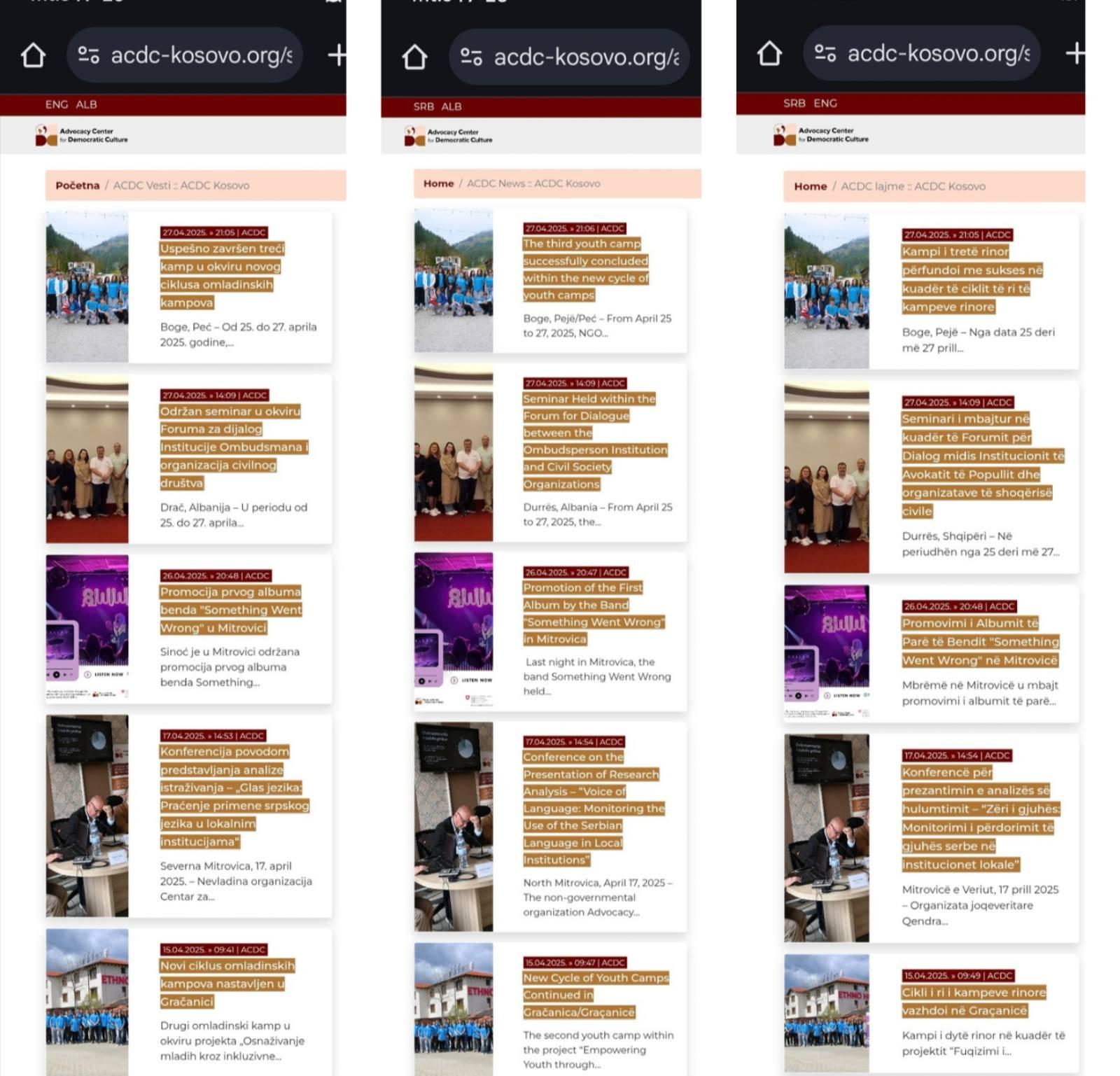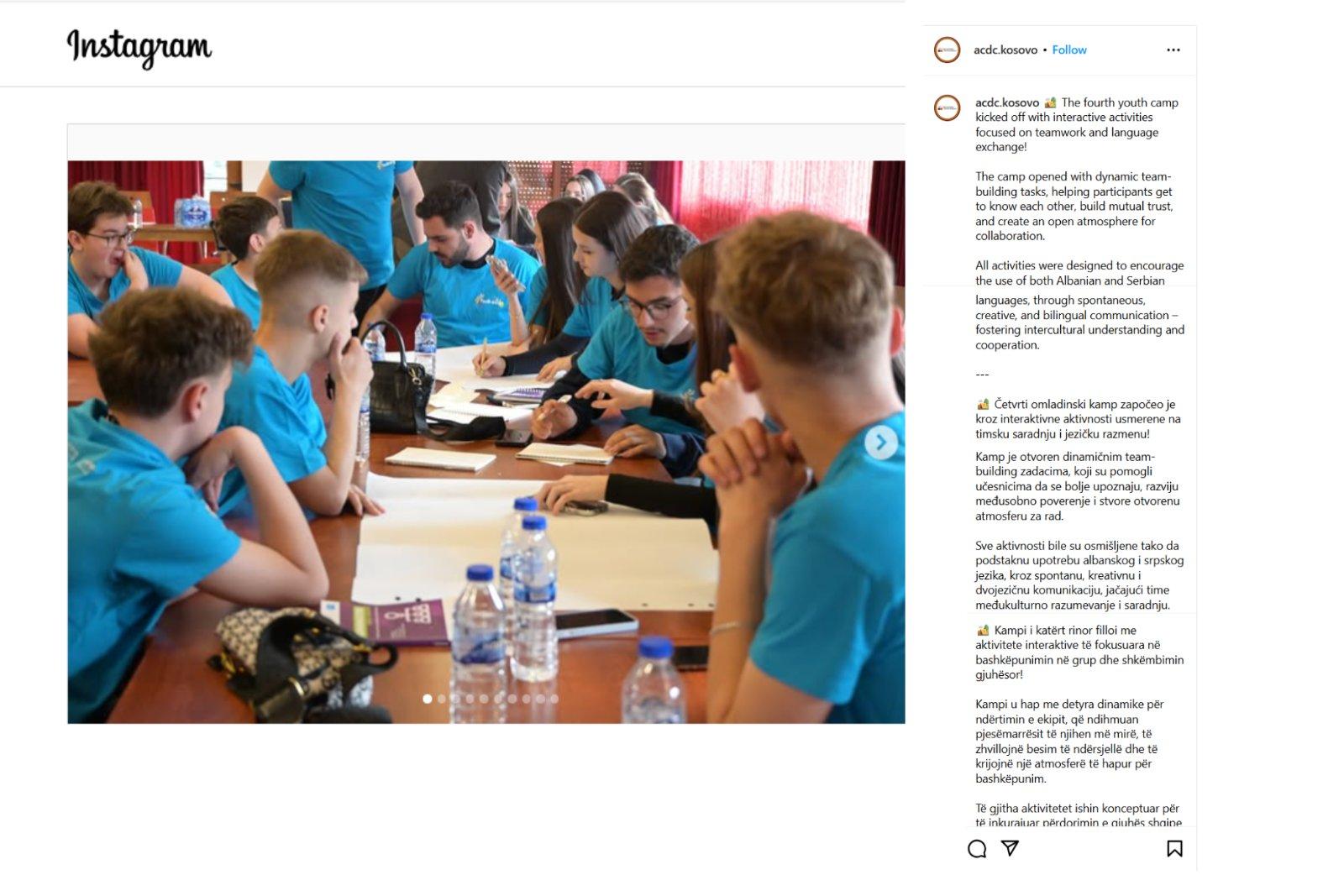Public communication, including documents, announcements, press releases, and other content, is consistently available in three languages: Serbian, Albanian, and English, according to an analysis of the official websites and social media accounts of Serbian civil society organizations. This model demonstrates a high level of professionalism and respect toward all communities living in Kosovo. Trilingual accessibility of information ensures that organizational messages and activities reach the broadest possible audience, thereby strengthening dialogue, cooperation, and participation of all stakeholders in societal processes—ranging from citizens and media to institutions and international actors.
The issue of systematic violations of the Law on the Use of Languages in Kosovo has been pointed out for years, yet it persists despite the legal framework[1] that guarantees equal use of Serbian and Albanian. As a result, non-majority communities, particularly those who communicate in Serbian, are consistently denied access to essential information. This was also noted in the European Commission’s 2023 Report on Kosovo[2] which highlighted this problem in several sections.
Therefore, NGO Aktiv, Radio Kim, New Social Initiative (NSI), Radio Goraždevac, and as of this week, the Advocacy Center for Democratic Culture (ACDC), continue their public advocacy campaign aimed at encouraging institutions to address this long-standing issue. This week, the spotlight is specifically on these civil society organizations: Aktiv[3], New Social Initiative[4] and ACDC.[5]
The multilingual presentation of civil society organizations’ work is particularly important given the broad range of topics they address. The civil sector in Kosovo plays a key role in monitoring respect for human rights, the rule of law, media freedom, gender equality, minority rights, access to public services, environmental protection, as well as issues related to education, healthcare, and the transparency of public institutions. Through reports, research, campaigns, and public engagement, these organizations consistently highlight societal problems and systemic shortcomings, acting as a corrective to government institutions and reminding them of their obligation to uphold the law and applicable regulations.
In this context, the availability of content in Serbian, Albanian, and English is not merely a technical issue, but rather a reflection of a fundamental commitment to inclusivity, accountability, and equal access to information for all citizens and international stakeholders, regardless of their ethnic or linguistic background. Multilingualism in communication is an essential prerequisite for the contribution of the civil sector to be properly understood and recognized across all communities and at all levels – local, central, and international.
Websites of Non-Governmental Organizations: A Model of Commitment to Equal Access to Information
Website: The home pages of the observed non-governmental organizations’ websites demonstrate a high level of compliance with the Law on the Use of Languages. From the very first step, visitors are given the option to select their preferred language—Serbian, Albanian, or English—ensuring equal access to essential information for all citizens, regardless of their linguistic background. Across all analyzed websites, categories and organizational goals are clearly and consistently translated. Furthermore, information about headquarters, addresses, visions, missions, and thematic focuses is presented in all three languages, with no discrepancies in content between language versions.
News: One of the key indicators of consistent multilingual implementation[6] on the analyzed websites is the “News” section. All published content—whether event announcements, field reports, responses, or analytical pieces—is available in three languages: Serbian, Albanian, and English. The content is clearly aligned across all versions, with no omissions, selective translations, or reductions, thereby ensuring equal access to information for all users.
Projects: The analysis of this category reveals a high level of linguistic consistency and transparency[7]. All implemented[8], nd ongoing projects are clearly presented in Serbian, Albanian, and English[9]. The multilingual presentation is not limited to titles and basic descriptions, but includes complete information—from project duration, general objectives, and activities, to details about donors and partner organizations. The content is thoroughly synchronized across all three languages, with no substantive differences, ensuring equal access to project information for all website visitors—citizens, media, institutions, and international stakeholders.
Publications: This segment represents yet another clear example of good practice when it comes to compliance with the Law on the Use of Languages. All publications[10] released by the organizations—including monthly and annual reports, research[11], analyses[12] and thematic studies—are available in three languages: Serbian, Albanian, and English. The content of the documents is fully aligned across all languages, with no differences in scope or translation quality. Moreover, among them are reports that directly address the issue of language rights, further confirming these organizations’ commitment to ensuring that their work aligns with the values they advocate.
Announcements of Events and Activities: This category further reinforces the consistency of multilingualism on the websites of civil society organizations. The full calendar[13] of upcoming activities—including[14] publication launches, press conferences[15], workshops, training sessions, and other public events—is regularly available in Serbian, Albanian, and English. Information about dates, locations, topics, and speakers, as well as supporting materials, is clearly and equally presented in all three languages.
CSOs on Social Media: Multilingualism as a Standard, Not an Exception
Facebook: An analysis of the Facebook pages[16] of the observed civil society organizations[17] reveals the same consistent practice of respecting language rights as on their official websites. All posts—including event announcements, meeting reports, calls for participation, initiatives, and public reactions—are regularly published in Serbian, Albanian, and English. Multilingualism[18] is also clearly applied to visual segments such as photographs, video content, and galleries. Each piece of accompanying content is consistently posted in all three languages, which further enhances accessibility and transparency.
X (formerly Twitter): The consistent application of multilingualism[19] is also evident in the communication of civil society organizations on the social media platform X. All posts[20], from brief updates and event announcements to public statements and calls to action, are regularly provided[21] in three languages: Serbian, Albanian, and English. Despite format limitations, organizations have found ways to maintain linguistic balance and ensure equal access to information for all users. Visual content, such as charts, infographics, and promotional visuals, also includes supporting text in all three languages.
Instagram: This platform[22] represents yet another example of consistency in aligning content across all languages. Despite its predominantly visual nature[23], civil society organizations[24] successfully implement multilingual communication practices, thereby reinforcing their commitment to language rights. Whether it’s textual posts, photographs, infographics, videos, or stories—content is regularly provided in three languages: Serbian, Albanian, and English. Accompanying captions, subtitles in videos, and descriptions in visual formats are adapted for all target audiences—citizens, media, and international stakeholders.
YouTube: The YouTube channels[25] of civil society organizations[26] offer another example of good practice in respecting linguistic rights in digital communication. All video content published on this platform is available in three languages—Serbian, Albanian, and English—through subtitles, simultaneous versions, or accompanying descriptions and titles. This approach[27] demonstrates that multilingualism can indeed be ensured even in audiovisual formats, making information accessible to all interested parties. The YouTube channels of these organizations exemplify a standard that public institutions themselves could follow to guarantee equal access to information for all communities.
Why Is This Important?
In previous analyses, we have consistently highlighted that the systematic neglect of the Serbian language by Kosovo institutions represents one of the most serious violations of language rights. This practice directly leads to the exclusion of an entire linguistic community from institutional communication, access to information, and the exercise of basic rights.
That is why the continuation of our campaign—this time focused on examples of good practice—aims to show that this problem is not insurmountable. On the contrary, solutions are possible where there is both institutional and political will. An analysis of the communication practices of civil society organizations clearly demonstrates that consistent compliance with the Law on the Use of Languages is both achievable and applicable in everyday operations. Their approach—delivering all activities, information, and materials simultaneously in Serbian, Albanian, and English—shows that respecting language norms is not only a legal obligation but also actively contributes to building trust, including all communities, and fostering mutual understanding. These organizations prove through their work that two-way and equal communication can become the standard, not the exception, in upholding legal norm.
The Law clearly states that Albanian and Serbian are equal official languages in Kosovo.
However, the long-standing institutional disregard for this obligation and continued silence in the face of ongoing violations of language rights deprive Serbian-speaking citizens, and other non-majority communities who rely on Serbian-language information, of their constitutionally and legally guaranteed right to equal access to public information.
This is why it is essential to move away from the practice of using unqualified translators or tools like Google Translate, and instead employ professional, certified translators who can ensure accurate and clear translations into Serbian. Establishing a functional translation system would guarantee smooth access to information of public importance. More importantly, it would demonstrate, in practice, the institutions’ genuine commitment to respecting not only language rights, but also fundamental human rights, such as those of non-majority communities, enshrined in the Universal Declaration of Human Rights.[28]
This analysis clearly demonstrates that examples of good practice in respecting language equality most often come from the civil society sector. Numerous civil society organizations—despite limited resources and significantly smaller budgets compared to Kosovo’s institutions—manage to regularly publish all their activities, publications, and digital content in three languages: Albanian, Serbian, and English. This fact clearly shows that the barriers to ensuring language equality are not merely a matter of capacity, but of institutional will and commitment. In this respect, Kosovo’s institutions have sufficient resources and capabilities to provide timely and high-quality translations of all content into Serbian. Doing so would further strengthen citizens’ trust and enhance inclusivity in public communication.
Therefore, we call on all institutions to follow the example set by the civil society sector and ensure that all their content is equally accessible in both official languages—Serbian and Albanian.
Once again, we urge the Office of the Prime Minister to move beyond political rhetoric without tangible results, abandon the practice of merely declarative commitments to minority rights, and instruct institutions to align language standards at all legally prescribed levels.
At the same time, we reiterate our appeal to the Office of the Language Commissioner to begin applying the legal provisions within its mandate. This includes building an institutional environment that respects constitutional and legal obligations, as well as protecting, promoting, preserving, and enforcing the language rights of all citizens of Kosovo.
We also continue to encourage all citizens to actively engage in this process and report any observed language irregularities to the relevant institutions, such as the Office of the Language Commissioner (zkgj.kpj@gmail.com) and the Ombudsperson’s Office (info.oik@oik-rks.org). Likewise, we once again invite everyone who encounters specific language-related issues to contact NGO Aktiv (office@ngoaktiv.org) and join us in calling on the responsible institutions to uphold the legally established standards.
[1] https://kryeministri.rks-gov.net/wp-content/uploads/2022/05/ZAKON_BR._02_L-37_O_UPOTREBI_JEZIKA1346.pdf
[2] https://enlargement.ec.europa.eu/document/download/c790738e-4cf6-4a43-a8a9-43c1b6f01e10_en?filename=Kosovo%20Report%202024.pdf
[3] https://ngoaktiv.org/
[4] https://newsocialinitiative.org/
[5] https://acdc-kosovo.org/sr-latn
[6] https://ngoaktiv.org/sve-vesti/
[7] https://ngoaktiv.org/svi-projekti/
[8] https://acdc-kosovo.org/sr-latn/projekti
[9] https://newsocialinitiative.org/sr/projekti/
[10] https://ngoaktiv.org/aktiv-publikacije/
[11] https://acdc-kosovo.org/sr-latn/analize-i-istrazivanja
[12] https://newsocialinitiative.org/sr/publikacije/
[13] https://ngoaktiv.org/svi-dogadaji/
[14] https://acdc-kosovo.org/sr-latn/najava-dogadjaja
[15] https://newsocialinitiative.org/sr/novosti/
[16] https://www.facebook.com/AktivMitrovica/
[17] https://www.facebook.com/Ngoacdc/
[18] https://www.facebook.com/newsocialinitiative/?ref=aymt_homepage_panel&eid=ARC1zE5EWOowKlvD3b-sGWUhCvmOA_ENteYoqb_D5q1sFIBKefNwu-w_HzuCTPI1UwKB0ZisHmXdBdSn
[19] https://x.com/ngo_aktiv
[20] https://x.com/ngo_acdc
[21] https://x.com/NSIMitrovica
[22] https://www.instagram.com/ngoaktiv_
[23] https://www.instagram.com/acdc.kosovo/
[24] https://www.instagram.com/nsimitrovica/
[25] https://www.youtube.com/channel/UC0ZcHcuqhL-nNG8FdK3AJSw
[26] https://www.youtube.com/@newsocialinitaitve/videos
[27] https://www.youtube.com/@ngoaktiv5717/videos
[28] https://www.ohchr.org/en/human-rights/universal-declaration/translations/serbian-latin-srpski










